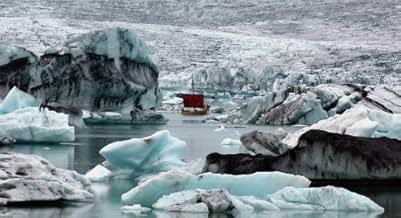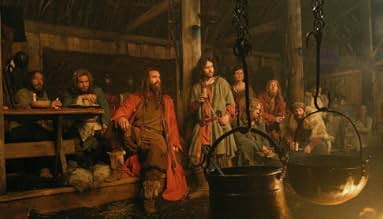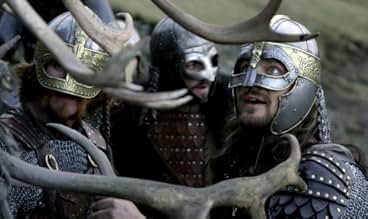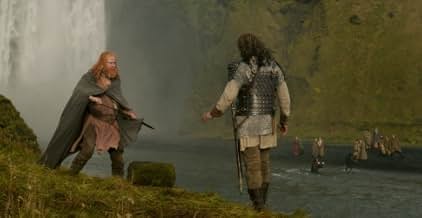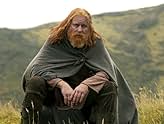Na Dinamarca, durante o século VI, o rei dinamarquês Hrothgar e os seus guerreiros matam um troll cujo filho, Grendel, jura vingança.Na Dinamarca, durante o século VI, o rei dinamarquês Hrothgar e os seus guerreiros matam um troll cujo filho, Grendel, jura vingança.Na Dinamarca, durante o século VI, o rei dinamarquês Hrothgar e os seus guerreiros matam um troll cujo filho, Grendel, jura vingança.
- Direção
- Roteiristas
- Artistas
- Prêmios
- 1 vitória e 6 indicações no total
- Grendel
- (as Ingvar E. Sigurdsson)
- Wealtheow
- (as Steinunn Ólína Thorsteinsdóttir)
- Erik
- (as Gísli Örn Gardarsson)
- Direção
- Roteiristas
- Elenco e equipe completos
- Produção, bilheteria e muito mais no IMDbPro
Avaliações em destaque
This European co-production begins with a real sense of wonder and surprise and develops with continuous struggles and winding up a fight against the giant Grendel. The picture packs great loads of action , wonderful cinematography , abundant stunts , breathtaking combats and a little bit of gore and blood . Stunning battles scenes illuminate the full-blown adventure with a plethora of engaging action set pieces on the combats in which the heads and limbs are slice off here and there and everywhere while other parts of body are slit open . Good performance from Gerard Butler as Beowulf , a man caught between sides in this great shift, his simple code transforming , falling apart before his eyes and the strange witch well played by Sarah Polley. Both of whom play a story of blood and beer and sweat, which strips away the mask of the hero-myth, leaving a raw and tangled tale .
Beowulf was a poem written in England, but is set in Scandinavia , commonly cited as one of the most important works of Anglo-Saxon literature .Beowulf is considered an epic poem in that the main character is a hero who travels great distances to prove his strength at impossible odds against supernatural demons and beasts. It has variously been dated to between the 8th and the early 11th centuries. It is an epic poem told in historical perspective; a story of epic events and of great people of a heroic past. Although its author is unknown, its themes and subject matter are rooted in Germanic heroic poetry, in Anglo-Saxon tradition recited and cultivated by Old English poets . The poem is divided between Beowulf's battles with Grendel and with a dragon . The main protagonist, Beowulf, a hero of the Geats, comes to the aid of Hrothgar, the king of the Danes, whose great hall, Heorot, is plagued by the monster Grendel. Beowulf kills Grendel with his bare hands and Grendel's mother with a sword, which giants once used, that Beowulf found in Grendel's mother's lair .
Other films based on this epic poem are the following : ¨Beowulf¨(1999) by Graham Baker with Christopher Lambert and Rhona Mitra , ¨The 13º warrior¨ by John McTiernan with Antonio Banderas , Diane Venora , and ¨Beowulf¨ by Robert Zemeckis with Angelina Jolie and Anthony Hopkins .
Let me first say that Grendel engaged me throughout the movie. There were good performances by many of the cast (Butler's conflicted hero, Skarsgard's noble-but-not-so-noble king) , but Ingvar Sigurdsson owned it as Grendel. Was it the skill of the writer and director in making Grendel a vulnerable human(?) and victim (drawing a sympathy vote from the audience)? Was it Ingvar Sigurdsson's acting skills to express intense emotions and engage the audience despite virtually any words in the script and enough prosthetic make-up to impede facial expressions? All I know is that I connected with Grendel's pain. And isn't that the point?
Another prominent character was the weather. It wasn't on the casting list, but it showed up nonetheless and fought for top billing. It helped to draw you into the ruggedness of the times and the story, but I also found it distracting. Perhaps it's my own distractibility, but for whatever reason, the scenery and weather engaged me more than the story a few times.
The soundtrack was indeed beautiful, but personally, I don't think it fit. To me, the campfire-to-mead-hall timeless folktale would have been better served by a more primitive collection of instruments rather than the majestic orchestra suited to an epic. But that's just my taste.
My main criticism is that to me, the film seemed choppy. I felt like I missed out on some important parts. (I didn't take any washroom breaks, did I?) It may have been the editing. There are others who enjoyed the film much better at the second viewing, so maybe it's all there in the movie beyond my distraction by the scenery and Gerard Butler's rugged good looks. Maybe the movie did its job; after all I'm still chewing on it 2 weeks later. Who knows? I did, however, catch the humor in the film. Andrew Rai Berzins' sharp wit and humor came to the rescue and drew me back in when distractions prevailed.
I'd really like to see it a second time now that my giddiness is over. I was anticipating this movie from the time filming began, and what film can live up to a year's worth of my ruminations and expectations? Now, don't ask me to rate the film with a number. I hate numbers. They don't mean anything. You should never see a movie based on numbers. See it because you want to.
and if my review left you with more questions than answers, then I've done my job, because that's where the movie left me. Now go see the movie and find your own questions and answers.
Anglo-Saxon poetry is alliterative, haunting, sad, and in a language utterly unlike modern English, completely strange. Here's how the poem begins, with translations for each line.
(You will have to look elsewhere, because the format of this website does not allow foreign languages.)
Which has been translated:
LO, praise of the prowess of people-kings of spear-armed Danes, in days long sped, we have heard, and what honor the athelings won! Oft Scyld the Scefing from squadroned foes, from many a tribe, the mead-bench tore, awing the earls. Since erst he lay friendless, a foundling, fate repaid him: for he waxed under welkin, in wealth he throve, till before him the folk, both far and near, who house by the whale-path, heard his mandate, gave him gifts: a good king he!
Along comes a movie, which doesn't have much US distribution but is currently showing in New York (July 2006). And I'm told there was a version with Christopher Lambert, but I have not seen it.
There are many translations but one by a poet of distinction recently done is that of the Irish poet Seamus Heaney. Here are a couple of short passages from Heaney's version:
You have won renown: you are known to all men far and near, now and forever. Your sway is wide as the wind's
It is always better to avenge dear ones than to indulge in mourning. For every one of us, living in this world means waiting for our end. Let whoever can win glory before death. When a warrior is gone, That will be his best and only bulwark.
This atmosphere that comes in the poem, even from a few lines, the importance of fame, of reputation, a deep fatalism, a sense of the power of nature and overwhelming sadness, are typical of Beowulf and of Anglo-Saxon poetry. But whether you get any of that from the movie I don't know.
What you do get is plenty of cussing, of F-words and S-words, spoken even by King Hrothgar and Beowulf himself, and body functions, and sexual intercourse with a monster, who, for reasons best known to the filmmakers, is referred to as a "troll." Perhaps in Iceland a "troll" can be a giant, but in English the word has more often been used for a dwarf. Grendel isn't a dwarf. In the poem you don't see him clearly. He has scales. He's a monster. In the movie he's a big man who babbles incomprehensibly and has big muscles. He's like the Hulk.
It's rather unfortunate that Sarah Polley plays a witch, one who has intercourse literally with both troll and man. Everybody else has some sort of rustic English accent, but she speaks mall American. That doesn't work, and neither does her presence.
In the time of the Angles and the Saxons, the mead hall was a place for carousing, but also a semi holy place. Men got drunk and swore oaths, which they were bound to for life. The mead hall scenes are huge in Beowulf, but they just look like moments from any minor historical mélange here in this movie. Hrothgar's hall's structure is realistically represented from the outside, though.
The snowy Icelandic landscape has an austere beauty that is one of the best things about this movie.
Ingvar Sigurdsson as Grendel is impressive; but it would still be more evocative of the story and the poem not to see him clearly. Gerard Butler is dashing as Beowulf. But the way he talks! Stellan Skarsgård as King Hrothgar appears very beaten down; in the poem he is, indeed, depressed and presumably drunken, but somehow that is nobler in the mind than on the screen.
Whereas there's a lot of history -- epics are repositories of history -- in Beowulf the poem, in the movie things and people aren't explained very much. You get a rough idea, but explanation is almost totally omitted, even though every once in a while somebody in a boat speaks a few lines of poetry carrying the story forwrd.
The music by Hilmar Örn Hilmarsson is astonishing and powerful, though it isn't the sad, slow music of the Anglos-Saxon poem. This is of course an action movie. But there isn't quite enough action. It made me think of the wonderful example of dramatic narrative on film, which is so succinct and gripping and atmospheric, and which evokes an archaic time among Scandanavian peoples: Nils Gaup's 1987 Pathfinder/Ofelas, a Norwegian-Finnish production shot in the snow. Smashing. Find it and watch it.
If this had been the result of real artistic vision, it might have worked, but it wasn't; it was done by the book, in a Sensitivity 101 fashion, and inconsistently, so that the result wasn't either mythic or modern. Or not the way the film-makers hoped, anyway. Instead of being a synthesis, it was an uneasy mix.
Oh, it was moderately entertaining to a modern man and woman, the scenery was magnificent and the cinematography splendid - almost a given, these days. The acting, with one important exception, was very good. I'm glad I saw that and not... what was the other one? Snow dogs in Peril? Oh, 'Eight Below'. 'Beowulf and Grendel' was actually about something, and not just 'based on actual events' - the usual witless excuse for a dull and meandering story.
What was Beowulf about? Originally - think about this - the tellers and hearers of this tale lived the dullest and most dangerous existence possible. They were pioneers, always on the jagged edge of starvation, faced with endless toil and unremitting vigilance, just to survive against an unremittingly hostile environment. They must have longed for a single villain, an enemy they could strike at and defeat, once and for all. Thus, Grendel. Grendel is all their fear and drudgery rolled into one. And Beowulf. He is them, all rolled into one, their collective courage and strength.
It might be possible to adapt this to modern ideals, but it has to be re-imagined, which likely means changing time and place to, let's say, the recent old-west, the populace to sodbusters, the Grendel-menace to an unbeatable black-hat gunslinger and the hero to the man in buckskin. You can't just graft modern attitudes onto ancient warriors and pretend you've done something new and significant.
The addition of the witch, Selma, played by my countrywoman Sarah Polley, is the worst of the modernist grafts. She plays the part almost without affect, as if all her actions were the product of cool rational thought, and didn't matter very much, anyway. I picture the director ranting at her in Icelandic, while a very polite translator murmurs, "more intense, please". I hate to bad-mouth one of the more intelligent actresses of our time, and one most loyal to her Canadian Roots, but she really dropped the ball on this one, and it affects the whole movie's credibility. If she'd been crazier, dirtier, more savage, more a part of the threatening Other, the role might have worked. Since she chose to preserve the proprieties of a modern girl --don't flip out, even when a troll is ravishing you -- she sinks the whole enterprise.
Final comment: handsome, amusing, entertaining, but highly flawed.
Você sabia?
- CuriosidadesIn 1731, the original manuscript that the movie is based on was severely damaged by fire, along with several other medieval writings, in London UK.
- Erros de gravaçãoWhile the Daneland portrayed in the movie has many mountains, cliffs and rocks, the real Denmark does not. Denmark has no rock formations, and very few steep cliffs.
- Citações
Beowulf: Has this thing, this troll, killed any children?
King Hrothgar: No.
Beowulf: Women?
[Hrothgar shakes his head]
Beowulf: Old men?
King Hrothgar: What are you saying? That he fights with a clean heart? He kills the strongest first. He shows us he can kill the strongest. Who cares if he spares the children? They'll die anyway without fathers.
Beowulf: My wits still war with how this all began.
King Hrothgar: Hate for the mead hall. I can only guess. The night we finished it the foul creep came.
Beowulf: So, nothing was done to the troll itself?
King Hrothgar: Oh, Beowulf, it's a fucking troll! Maybe someone looked at it the wrong way.
Beowulf: Some Dane?
King Hrothgar: ...I never begged anyone to come here. Take on our fight. I don't hold you here.
Beowulf: I know you don't.
King Hrothgar: Then don't sour my heart with talk about why a troll does what a fucking troll does!
- ConexõesFeatured in Wrath of Gods (2006)
Principais escolhas
- How long is Beowulf & Grendel?Fornecido pela Alexa
Detalhes
- Data de lançamento
- Países de origem
- Central de atendimento oficial
- Idiomas
- Também conhecido como
- Beowulf & Grendel
- Locações de filme
- Empresas de produção
- Consulte mais créditos da empresa na IMDbPro
Bilheteria
- Faturamento bruto nos EUA e Canadá
- US$ 68.820
- Fim de semana de estreia nos EUA e Canadá
- US$ 4.360
- 18 de jun. de 2006
- Faturamento bruto mundial
- US$ 92.076
- Tempo de duração1 hora 44 minutos
- Cor
- Mixagem de som
- Proporção
- 1.78 : 1(original negative)
- 2.35 : 1
Contribua para esta página



